< Back
10 Best AI For Research (2024)
Declan Gessel
Sep 15, 2024
AI is transforming research. Whether you're rushing to find sources for an essay or exploring a new topic, AI can help you find what you need. These tools streamline the process, making gathering and understanding information easier. In this guide, you'll discover the top ten AI tools for research in 2024.
One standout is Jotbot's solution, Source Finder. This tool finds sources quickly, making it easier to complete your research.
Table Of Contents
Step-by-Step Guide to Choosing the Right AI Tool Based on Research Needs
Write Smarter With Jotbot's Source Finder — Start Writing for Free Today
The Evolution of AI in Research (2024)

AI has sped up to become a cornerstone in both academic and professional research. Think of it as the new essential gear for anyone in the research field. Tools like Consensus and Elicit are cutting-edge. Consensus acts as an intelligent search engine, digging through millions of academic papers to give you the gist and pinpoint relevant studies. Elicit, on the other hand, automates the heavy lifting of literature reviews, letting you dive into the real work of interpreting data.
Supercharged Research: AI Tools that Transform the Way We Work
Repetitive research tasks? AI can handle those. Tools like Scite and Trinka are advanced. Scite uses natural language processing to gauge the reliability of sources by looking at how citations are used in papers. Trinka ensures your writing meets high standards by focusing on grammar and style corrections. With AI handling these mundane tasks, researchers can focus on what matters.
Leveling the Playing Field: How AI Democratizes Research
AI tools are breaking down barriers in the research world. By making sophisticated tools accessible to everyone, AI enables high-quality investigations across the board. ResearchRabbit, for instance, lets users create paper collections and get recommendations based on their interests. It’s like having a personalized Spotify playlist but for your research needs.
The Perks of Using AI Tools in Research
Discover the benefits of AI tools in research are endless:
Efficiency
AI takes over time-consuming tasks like data collection and citation management.
Accuracy
These tools minimize human error, enhancing the quality of research.
Collaboration
AI fosters collaboration by making it easy to share findings and insights.
Diverse Resources
AI analyzes a wide range of sources, giving you comprehensive insights.
Real-time Feedback
Tools like Wordvice AI offer instant feedback on writing quality, helping you refine your work before submission.
Related Reading
Criteria for Choosing the Best AI for Research in 2024

Quality of Data Analysis: Precision in Every Byte
When hunting for the best AI research tools, data analysis is where the rubber meets the road. You need software that doesn't just process data but understands it. Seek out AI that employs Natural Language Processing and Machine Learning to dissect qualitative data with surgical precision. These tools can automate tasks like coding and thematic analysis, slashing the time you spend and upping the accuracy of your findings.
Imagine having the power of predictive analytics at your fingertips to foresee trends and outcomes. In fields like social sciences, this capability isn't just excellent to have—it's indispensable.
Ease of Use and Integration: Streamlined Simplicity
You’ve got deadlines; the last thing you need is a tool that feels like a puzzle, missing half the pieces. Look for AI solutions with interfaces that are intuitive and straightforward. They should seamlessly integrate with your existing platforms, like Google Drive and Microsoft Teams. The best tools won’t make you jump through hoops. They’ll automatically transcribe and analyze data from various sources, letting you focus on what matters—your research.
Advanced AI Features: Beyond the Basics
The AI you choose should come loaded with advanced features. Natural Language Processing is a must for textual data analysis. Machine Learning lets the tool get smarter, improving its analytical chops. And predictive analytics? That’s your crystal ball for forecasting trends. These features are not just add-ons but essential for extracting actionable insights and streamlining your research.
Customization and Flexibility: Tailor-Made for You
Your research is unique, and your AI should be too. Look for tools that offer robust customization options. Maybe you want to tailor coding schemes for qualitative analysis or adjust sentiment analysis parameters to fit your study. The best tools will let you create personalized dashboards for data visualization, allowing you to focus on what’s important to you. This level of customization empowers you to align the AI with your specific goals and methodologies.
Security and Compliance: Guarding Your Data
Data security isn’t just a box to check; it’s a priority. The AI tools you choose should offer robust security features like data encryption and secure user authentication. Compliance with regulations like GDPR is non-negotiable, especially when dealing with international data. Ensure the tool you pick is transparent about how it processes and stores your data. This builds trust and ensures you’re adhering to ethical research practices.
Start Writing For Free With Jotbot

Jotbot is your personal document assistant and source finder. Join 500,000+ writers, students, teams, and researchers worldwide to write more, write better, and write faster with Jotbot's AI writing assistant. Write more innovative, not harder, with Jotbot's AI writing assistant. Start finding sources that are accessible with Jotbot's source finder today. Sign in with Google and get started in seconds.
Top 10 AI Tools for Research in 2024

1. Jotbot
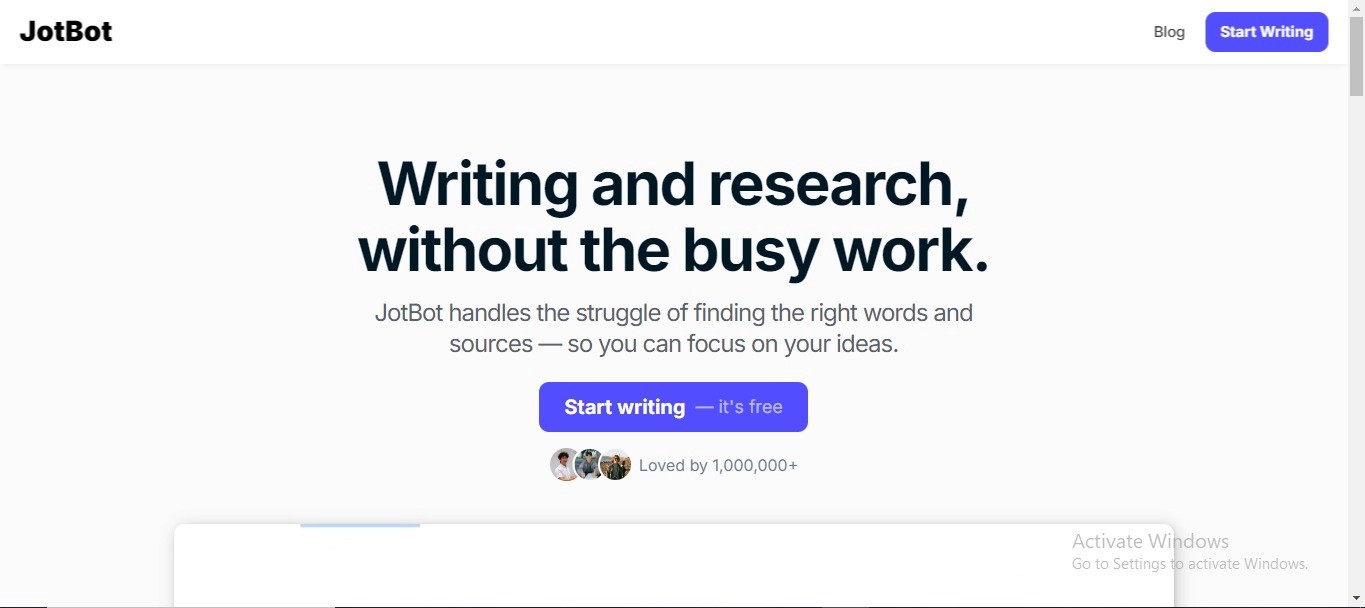
Your AI-powered writing assistant, Jotbot, is designed to help researchers streamline their writing process. With features like idea generation, content structuring, real-time collaboration, and AI-powered suggestions, Jotbot enables you to draft high-quality documents quickly and efficiently. Jotbot stands out for its focus on content creation and organization and is ideal for academic researchers, students, and professionals. Its real-time collaboration feature makes it especially valuable for teams.
2. Elicit
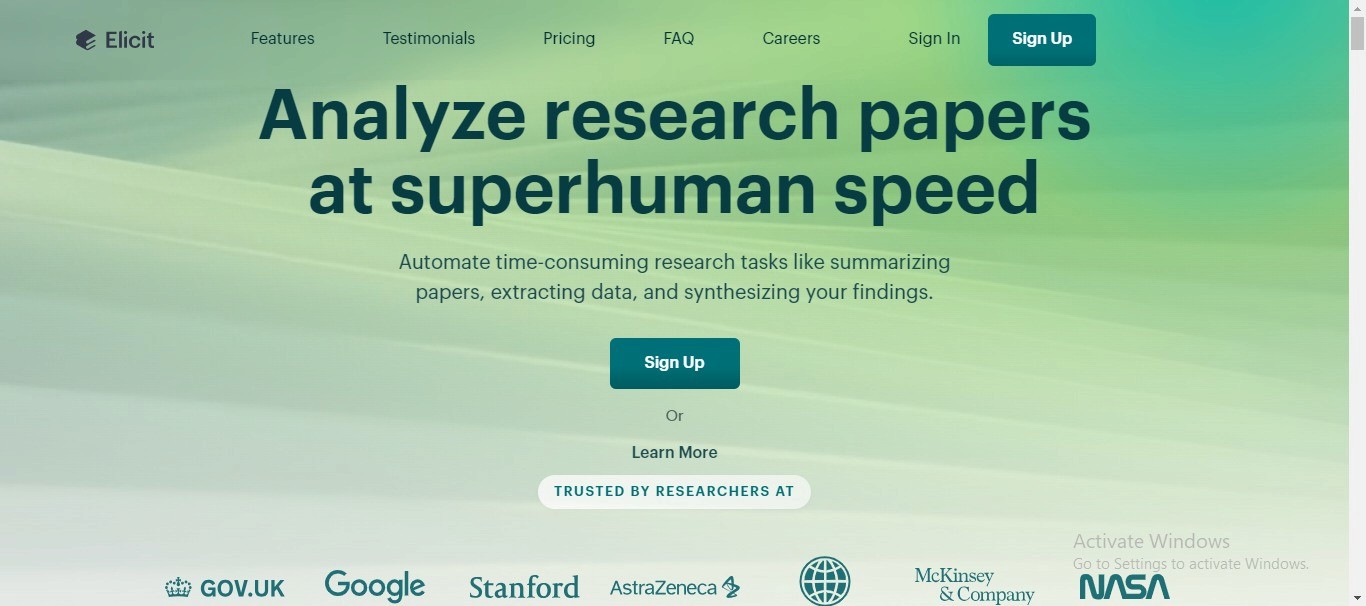
A research tool for literature reviews and data analysis, Elicit allows you to customize workflows and streamline the research process. Elicit is highly customizable for different research needs with features like data extraction and collaboration tools. Best suited for academic researchers and graduate students, Elicit’s ability to create customizable workflows sets it apart.
3. Scite
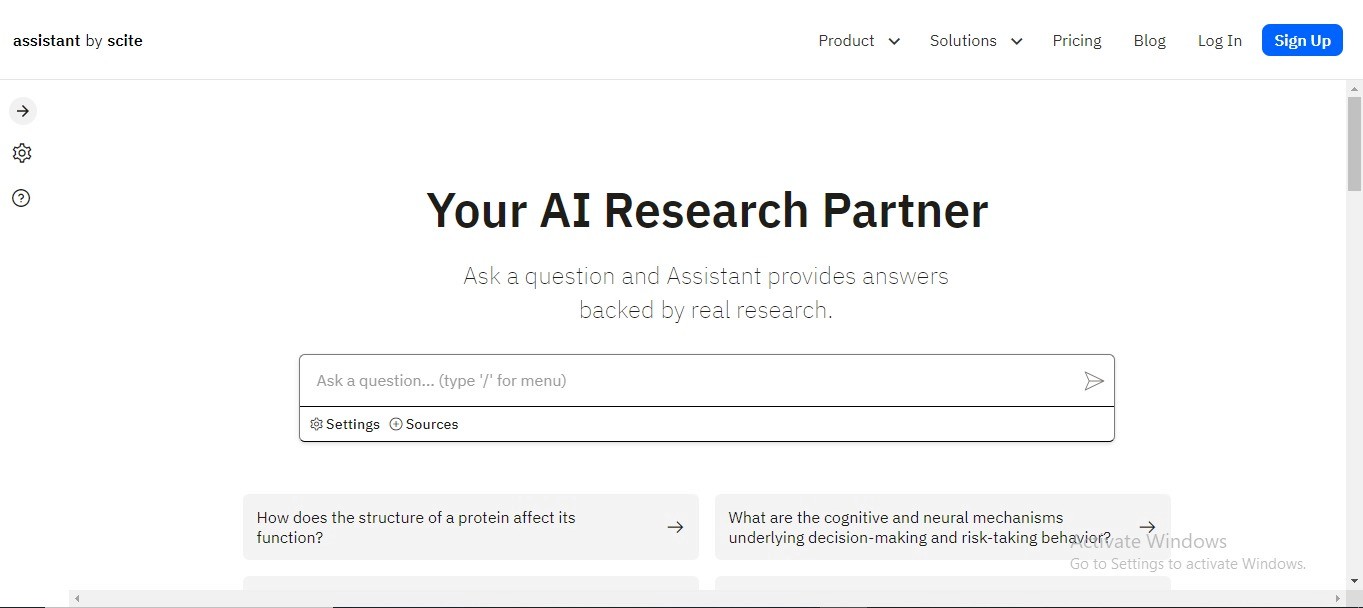
A citation analysis tool that evaluates the context of citations in academic papers, Scite helps you assess the reliability of sources. Scite provides deeper insights into citation contexts with innovative citations and research trends analysis. Ideal for academic researchers and anyone needing in-depth citation analysis, Scite’s innovative citation feature is a unique differentiator.
4. ResearchRabbit
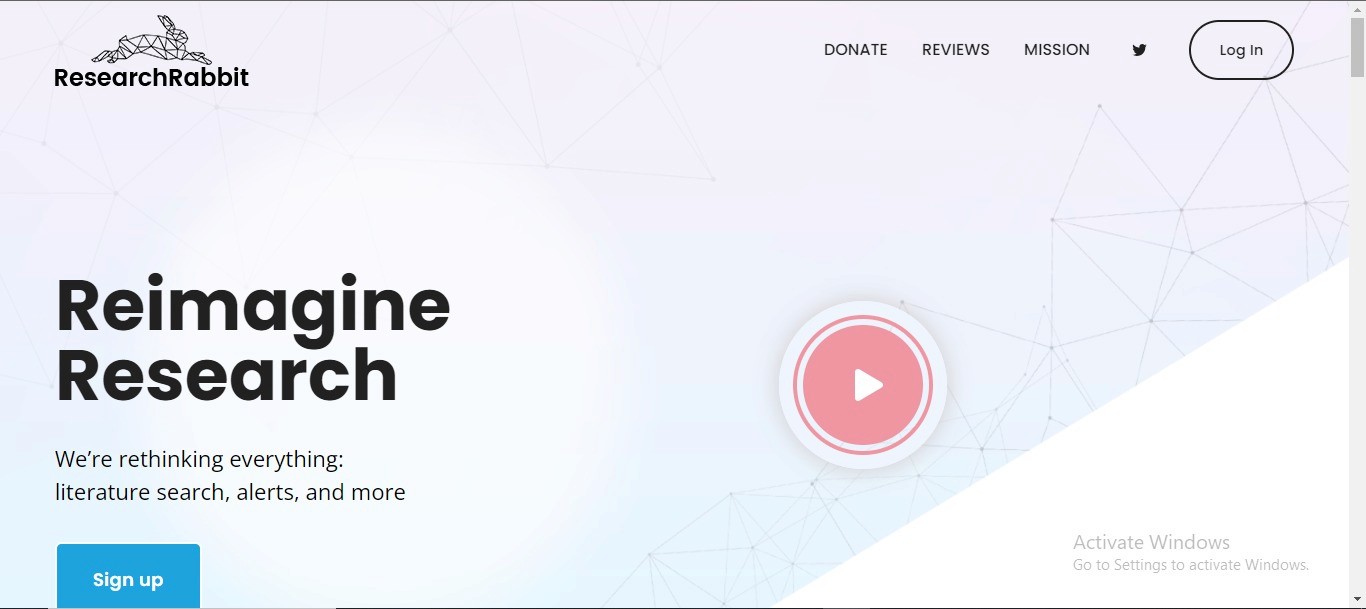
A literature discovery tool that helps you explore scientific literature efficiently, ResearchRabbit offers visual exploration, personalized recommendations, and collaboration features. Best for academic researchers and students, ResearchRabbit’s visual exploration feature sets it apart by showing connections between different research papers.
5. ChatPDF
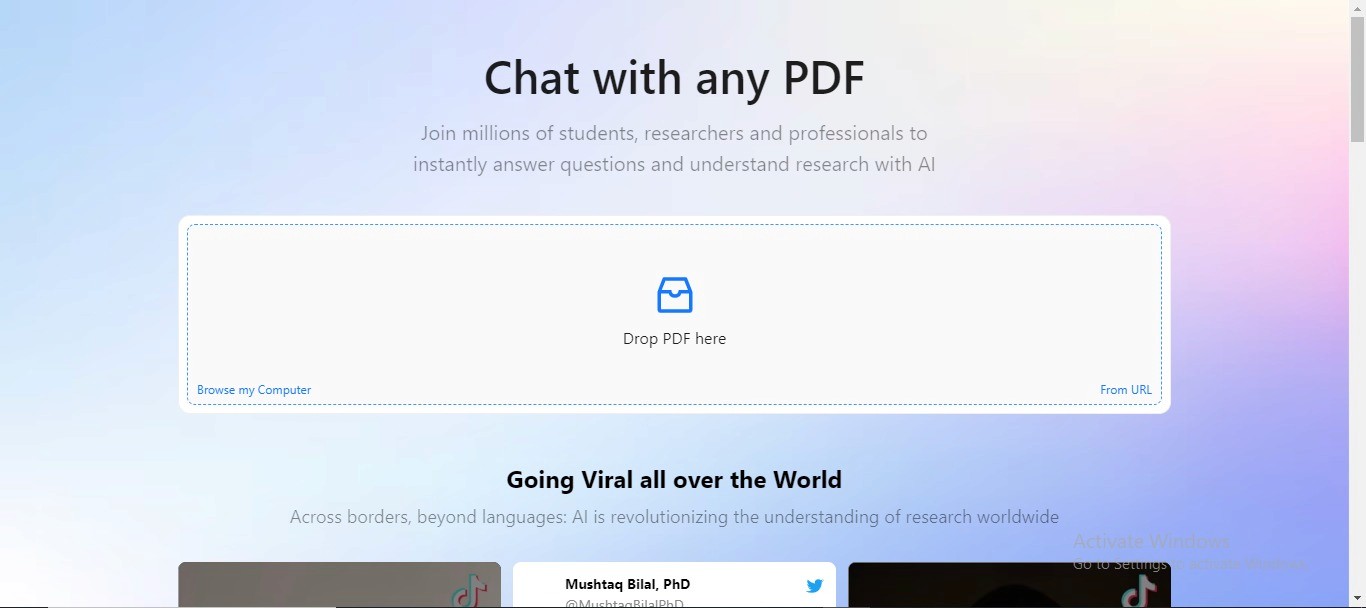
An interactive AI tool that allows you to engage with PDF documents by asking questions and receiving instant answers. With a conversational interface and multi-document support, ChatPDF simplifies finding specific information in PDFs. Suitable for researchers and students, ChatPDF’s interactive interface is a unique differentiator.
6. Wordvice AI
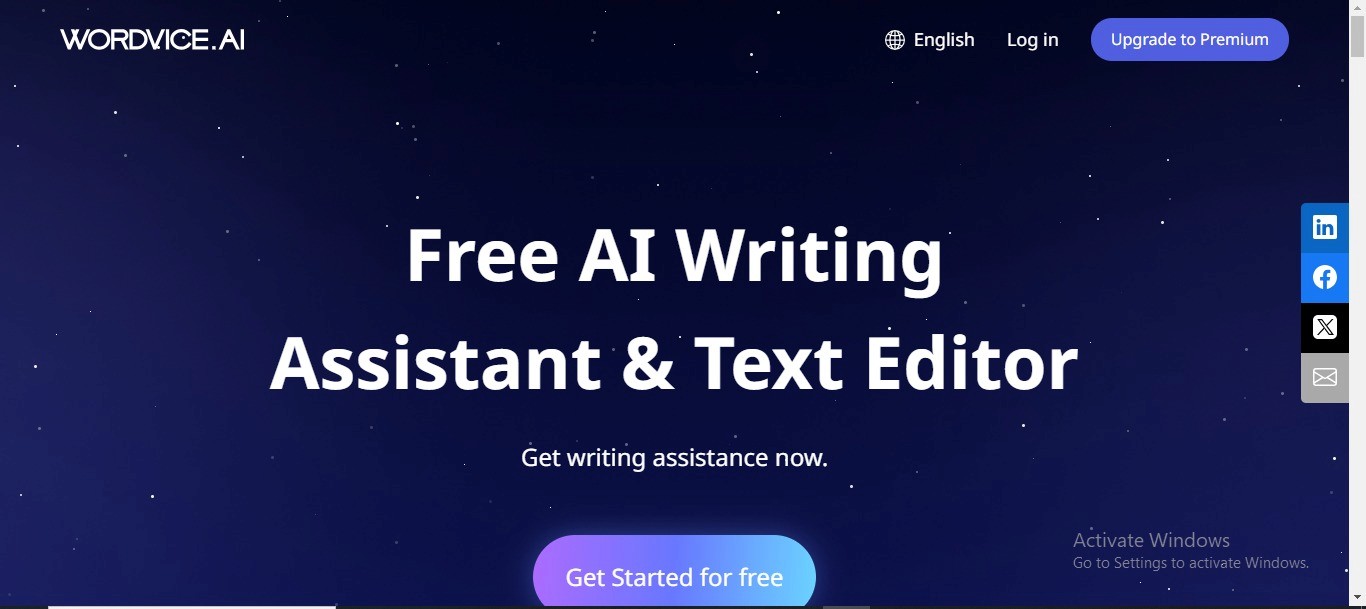
A writing assistant designed to enhance the quality of academic writing through real-time editing and feedback. With features like an AI proofreader, plagiarism checker, and translation services, Wordvice AI improves writing quality significantly. Best for academic researchers and students, Wordvice AI’s combination of proofreading and plagiarism checking is a unique differentiator.
7. ExplainPaper
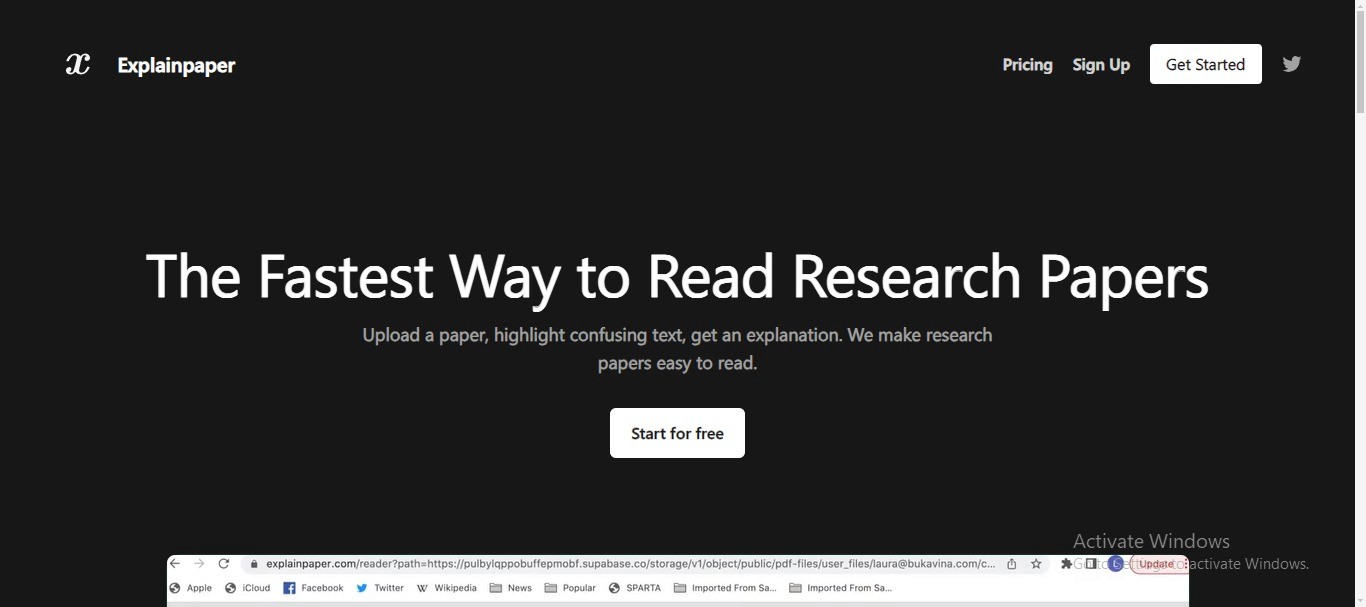
An AI tool that simplifies complex academic papers by providing explanations and summaries. With features like concept simplification and interactive learning, ExplainPaper makes complex research accessible to a broader audience. Suitable for students and researchers, ExplainPaper’s focus on simplifying academic language is a unique differentiator.
8. Litmaps
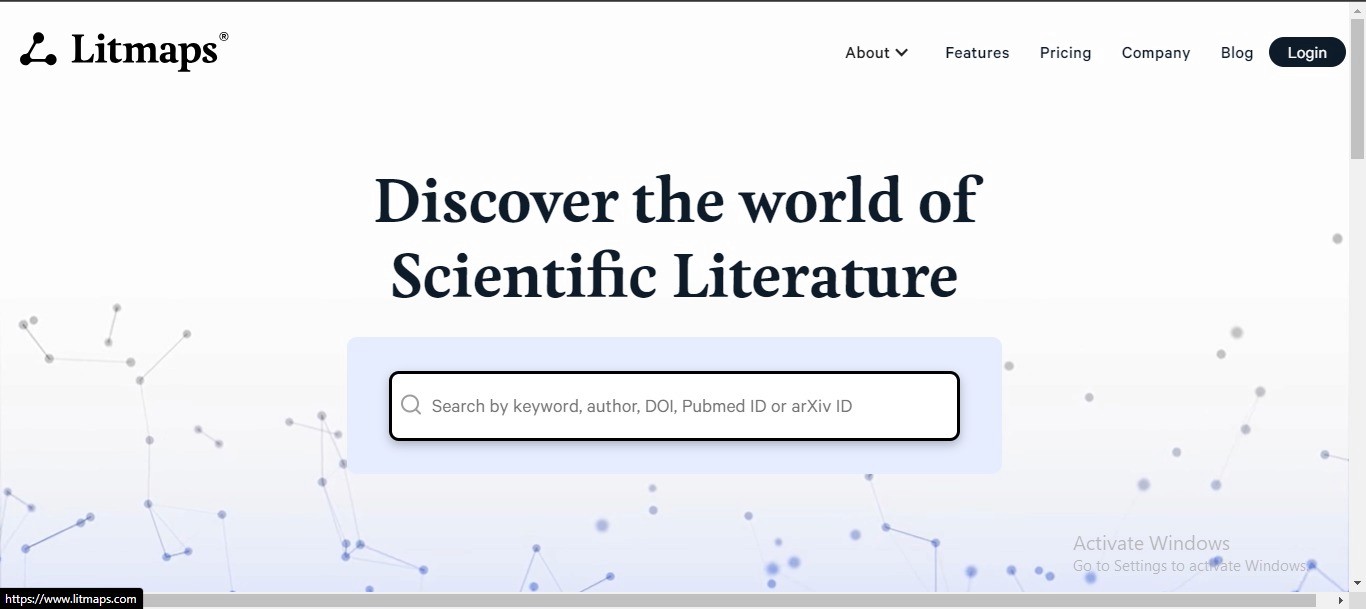
A literature discovery tool that visualizes citation networks among academic papers, helping you uncover relevant literature. With dynamic visualization and automated alerts, Litmaps enhances literature exploration. Best for academic researchers and students, Litmaps’ dynamic visualization of citation networks is a unique differentiator.
9. Datawrapper
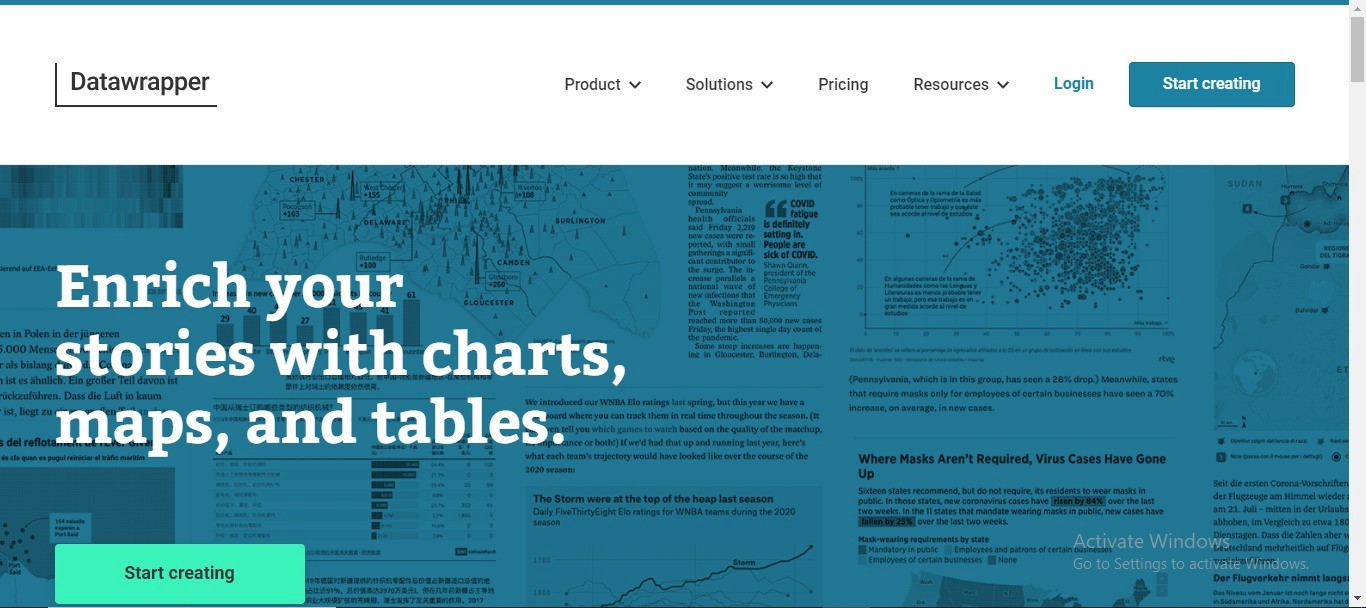
A data visualization tool that helps researchers create interactive charts and maps to present findings effectively. With a user-friendly interface and customization options, Datawrapper enhances the presentation of research findings. Ideal for researchers and data analysts, Datawrapper’s focus on interactive visualizations is a unique differentiator.
10. Numerous
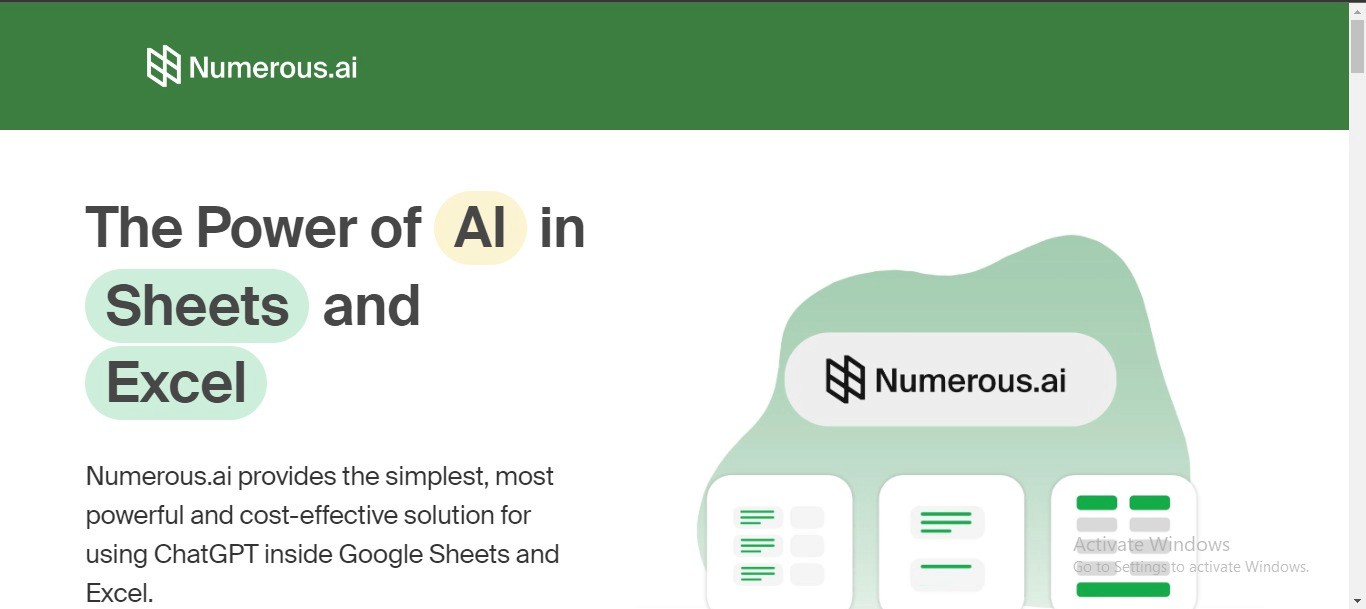
A versatile AI tool that enhances productivity in research through data analysis and project management features. Numerous streamlined data analysis processes with features like a spreadsheet AI tool, automation, and collaboration tools. Best for researchers and analysts, Numerous integration with spreadsheet applications is a unique differentiator.
Start Writing For Free With Jotbot
Jotbot is your personal document assistant and source finder. Jotbot does AI note-taking, AI video summarizing, and AI citation/source finder; it writes AI outlines for essays and even writes entire essays with Jotbot’s AI essay writer.
Join 500,000+ writers, students, teams, and researchers worldwide to write more, write better, and write faster with Jotbot's AI writing assistant. Write more competent, not harder, with Jotbot's AI writing assistant. Start finding sources that are accessible with Jotbot's source finder today. Sign in with Google and get started in seconds.
A Deep Dive Into The Role of AI in Modern Research

The Role of AI in Modern Research
Artificial Intelligence is not just a buzzword; it's a game-changer in modern research. By automating time-consuming tasks and offering sophisticated analytical tools, AI enhances the efficiency and accuracy of research across disciplines. Whether working in academia, science, or business, AI can significantly improve your workflow. Imagine extracting relevant data from massive datasets without breaking a sweat or having lengthy articles summarized into digestible insights. Tools like Jotbot provide these capabilities, allowing researchers to focus on critical analysis rather than tedious data collection.
Automating Data Extraction: Let AI Do the Heavy Lifting
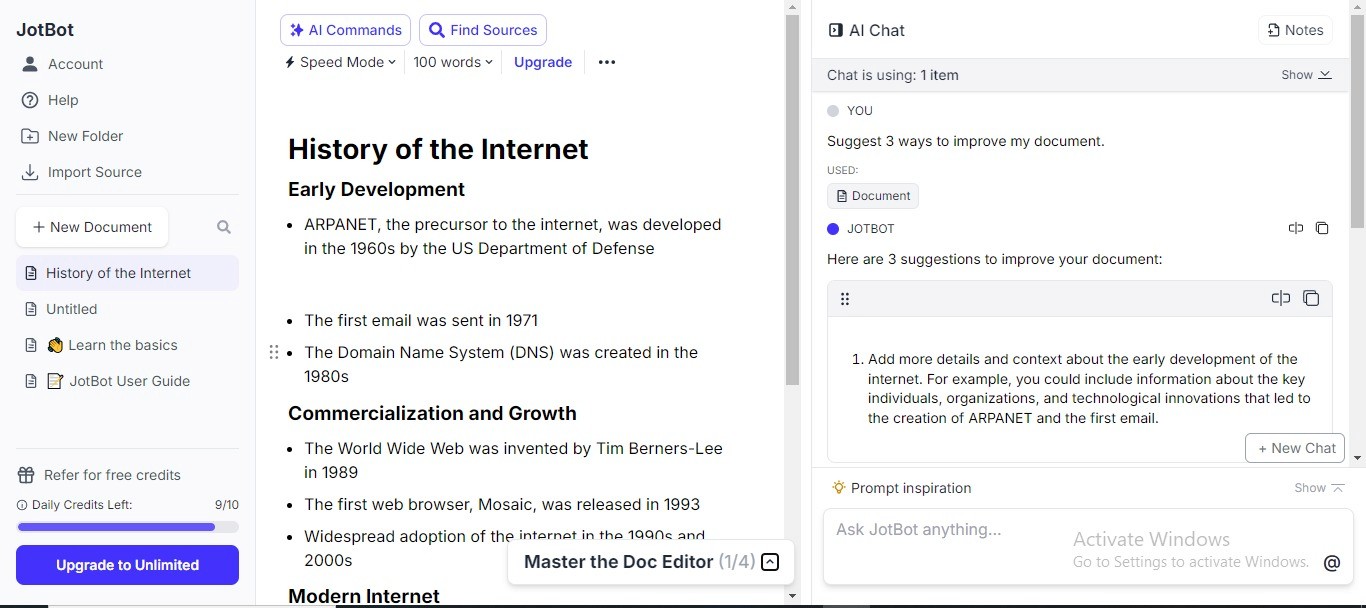
One of the most time-consuming aspects of research is data collection. With AI, this task becomes a breeze. AI-powered tools can automatically extract relevant information from extensive datasets, saving you hours of manual labor. Imagine being able to capture critical insights from audio and video recordings without having to take notes. Jotbot's automatic transcription feature allows researchers to focus on analysis rather than data collection.
Summarization and Analysis: Get to the Point Faster
AI algorithms can quickly sift through lengthy research articles, extracting key themes and insights. This capability is a game-changer for researchers who need to stay on top of the latest developments in their field. Jotbot excels in this area, providing concise outlines for essays and summarizing videos so researchers can quickly grasp essential information. According to a report by McKinsey, organizations that implement AI for data analysis can improve productivity by 20-30%.
Improved Efficiency: Streamline Your Workflow
AI tools can streamline various research tasks, such as organizing materials and generating citations. Jotbot's citation/source finder automates finding and formatting citations, ensuring that research is well-supported and credible. This efficiency allows researchers to complete projects faster and with greater accuracy.
AI-Powered Tools: From Assistants to Innovators
The shift from traditional research methods to AI-driven innovation is evident across multiple domains. Tools like Jotbot and Consensus are revolutionizing literature reviews and academic writing processes. Jotbot assists in generating structured outlines and provides writing suggestions, while Consensus offers evidence-based answers to research questions. This transition enables researchers to produce high-quality work more efficiently, with Jotbot as a versatile writing assistant.
Future Trends in AI Research Tools: What's Next?
As AI technology continues to evolve, several trends are emerging that will shape the future of AI in research. One exciting development is the integration of AI with augmented reality (AR) and virtual reality (VR) technologies. This integration will create immersive research experiences, allowing researchers to simulate complex environments for experiments or visualize data in three dimensions.
Another trend is incorporating more advanced predictive analytics capabilities, enabling researchers to forecast trends and outcomes based on current data. Finally, as AI becomes more prevalent in research, there will be an increasing focus on ethical considerations, including data privacy and algorithmic bias. Researchers must ensure that their AI tools, like Jotbot, maintain transparency regarding how data is processed and stored, fostering trust and ensuring ethical research practices.
Step-by-Step Guide to Choosing the Right AI Tool Based on Research Needs

Start with Your Research Goals
First, get clear about what you're trying to accomplish. Are you neck-deep in data analysis, or is citation management more your speed? Maybe you need to sift through piles of literature. Pinpointing your specific challenges is step one. If you’re wrestling with massive datasets, you’ll want a tool that shines in data visualization.
Decide Between General and Specialized Tools
Do you need an all-around helper or a specialist? You may need a general AI tool like Jotbot to guide your writing and organize ideas. On the other hand, a specialized tool like Scite might be your best bet for citation analysis.
Figure Out the Key Features You Need
Consider what features will make it easier once you know what you’re doing. Text-heavy research means you might need Natural Language Processing. If you're into predictive analytics, machine learning will be crucial. Data visualization tools can make complex data more digestible. If you’re knee-deep in qualitative research, a tool like Insight7 will help you analyze interviews and identify key themes.
Check for Compatibility
You’ll want your new AI tool to integrate well with your existing tools. Whether it's reference managers like Zotero or databases, seamless integration can save you a headache. Look for tools like Numerous that work with your existing systems, such as Microsoft Excel or Google Sheets.
Make Sure It's Secure
No one wants their data out in the wild. Make sure your chosen tool complies with privacy regulations like GDPR or HIPAA. This is especially important if your research is in healthcare or working in Europe. Also, check that it aligns with any institutional policies you must follow.
Take It for a Spin
Before you commit, use free trials or demos. This is your chance to see if the tool is user-friendly and effective in real scenarios. Pay attention to how easy—or hard—it is to navigate.
Make an Informed Choice
After testing various tools, gather your findings. Compare features, usability, and pricing options. Choose the one that meets your needs and fits your budget. If collaboration and idea organization are top priorities, you might go with Jotbot. If you’re more focused on citation management, Scite could be the one.
Related Reading
• Reference Finder
• How to Cite AI
• AI For Literature Review
• Websites Like Google Scholar
• AI That Cites Sources
• Best Academic Search Engines
• Best AI Tool For Research
• Academic Research Software
• How To Use Chat GPT For Research
• Best Research Tools For Students
Best Practices for Using AI Tools in Research

AI transforms research by letting you analyze and summarize data at lightning speed. Imagine sifting through massive datasets, cleaning them, finding patterns, and visualizing results—all in a fraction of the time it used to take. Tools like Consensus and Elicit generate concise summaries of research papers, while Scite evaluates citations to assess source reliability. But be careful. AI can miss critical details or insert biases, so constantly review the sources to understand the complete picture.
Keep Humans in the Loop
AI tools are powerful, but they aren’t infallible. Always keep a human in the loop to ensure accuracy, relevance, and ethics. It’s crucial to evaluate AI-generated insights with a critical eye. AI might misinterpret context or sarcasm, leading to inaccurate conclusions. Your expertise and domain knowledge are indispensable for validating AI results.
Make AI Work for You
Integrate AI tools seamlessly into your existing workflows to maximize their potential. Ensure they’re compatible with your platforms, enabling smooth data transfers and minimizing manual effort. Tools like Numerous and Datawrapper work well with spreadsheet applications, making AI capabilities accessible within familiar software. Just be mindful of data privacy and security when sharing sensitive information.
Stay Ahead of AI Trends
AI technology is evolving rapidly, so keep your tools updated and stay informed about new features. Attend workshops, read industry publications, and participate in online communities to keep pace with the latest advancements. Remember, some AI models may have biases or lack transparency, so understand the algorithms and data used to train them.
Collaborate for Success
Leverage AI tools that foster collaboration and help you share insights across teams and disciplines. Tools that support real-time sharing and commenting encourage cross-functional discussions and benefit from diverse perspectives. ResearchRabbit allows you to create and share paper collections, while Jotbot supports collaborative writing and idea organization. Just be aware of data ownership and intellectual property rights when collaborating.
Prioritize Transparency and Accountability
Maintaining transparency and accountability is critical when using AI tools in research. Document the tools used, data sources, and methodology. This ensures replicability and aligns AI tools with ethical and professional standards.
Be aware of potential biases and limitations in AI tools. Some models may reflect societal biases in their training data, leading to discriminatory outcomes. Actively work to mitigate these biases by using diverse datasets and regularly auditing your AI tools for fairness and inclusivity.
Unlock the full potential of your research with Jotbot. This AI writing assistant is designed to help you find sources, take notes, and even write essays. Write more intelligently, not harder, with Jotbot's AI writing assistant. Start finding sources that are accessible with Jotbot's source finder today. Sign in with Google and get started in seconds.
Solutions and Challenges in Using AI for Research

Navigating Data Privacy With AI
Handling massive amounts of data with AI is both an opportunity and a challenge. Privacy concerns can’t be ignored, especially with sensitive information. Think of unauthorized data collection or breaches. They're real threats. So, what do we do? First, AI tools that align with regulations like GDPR or HIPAA should be used. This ensures your tools have a solid privacy framework. Next, practice data minimization. Only gather what you genuinely need, lowering the risk of misuse.
Conquering the Learning Curve
Getting accustomed to new AI tools can be overwhelming. The tech is excellent, but the initial learning curve can trip you up. To ease this transition, use structured training programs. Workshops, webinars, and hands-on practice can speed things up. Also, get into the documentation. User manuals, online tutorials, and community forums are goldmines of information. Dive in, and you'll find the learning process smoother.
Balancing Cost and Value
AI tools can be pricey, putting pressure on those with tight budgets. The key is to know if the cost is justified. Conduct a cost-benefit analysis to assess the potential return on investment. Look at time saved, accuracy improved, and enhanced research capabilities. Another tip? Explore freemium models. These allow you to test basic functionalities without a big financial commitment. It’s an intelligent way to determine if a tool is worth it.
Fortifying Security Protocols
Security features are a must for any AI tool you choose. Look for solid encryption protocols, secure user authentication, and compliance with privacy standards. Evaluating these features from the start is crucial. Regular security audits can also help identify vulnerabilities and ensure compliance. This proactive approach protects your data from threats.
Streamlining User Training and Support
Training resources and customer support are your allies in shortening the learning curve. Look for AI tools that offer dedicated support teams. They can assist with technical issues and questions. Encourage peer learning, too. Experienced users can mentor new ones, fostering a collaborative learning environment.
Leveraging Freemium Models and Discounts
Freemium models and educational discounts can help you test AI tools without high upfront costs. Trial periods allow you to evaluate a tool's effectiveness before making a financial commitment. Many AI providers offer educational discounts for academic institutions, so research these options to reduce costs.
Start Writing For Free With Jotbot
Jotbot is your personal document assistant and source finder. Jotbot does AI note-taking, AI video summarizing, and AI citation/source finder; it writes AI outlines for essays and even writes entire essays with Jotbot’s AI essay writer.
Join 500,000+ writers, students, teams, and researchers worldwide to write more, write better, and write faster with Jotbot's AI writing assistant. Write more innovative, not harder, with Jotbot's AI writing assistant. Start finding sources that are accessible with Jotbot's source finder today. Sign in with Google and get started in seconds.
Why Jotbot Stands Out for Researchers

Every researcher knows the struggle of sifting through hours of lectures or videos to extract key insights. Jotbot’s AI-powered note-taking feature takes that burden off your shoulders. By automatically transcribing audio and video content, it captures the essence of the material, letting you focus on what truly matters. No more frantic scribbling or replaying videos to catch every detail. This tool ensures you don’t miss critical information and can easily revisit it later, streamlining your research journey.
Finding Credible Sources Fast
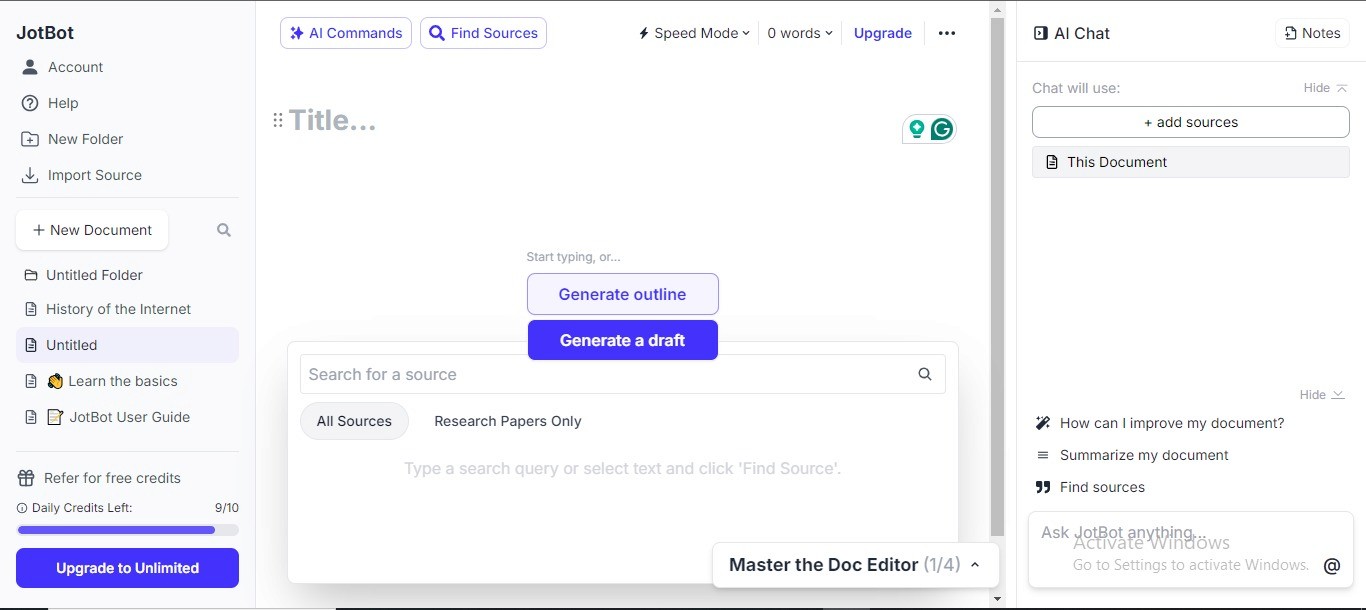
The next big headache in research is finding reliable sources. Jotbot shines here, too. Its source-finding capability swiftly locates academic and web references based on your queries, ensuring you’re armed with credible information. This feature is a boon for researchers who need to back up their arguments with solid evidence. Instead of spending hours combing through databases, you get a curated list of relevant sources at your fingertips. This efficiency boost allows you to dive into analysis and interpretation sooner.
Stress-Free Citation Management
Citations can be a nightmare, especially when juggling different formats. Jotbot simplifies this process by generating citations automatically. Whether you need MLA, APA, or any other format, Jotbot has you covered. This not only saves you time but also ensures accuracy, a crucial factor in maintaining academic integrity. With Jotbot handling citations, you can focus on crafting your narrative rather than worrying about misplaced commas or incorrect italics.
Real-World Success Stories
Jotbot isn’t just a theoretical tool; it’s making a difference in real-world scenarios. Graduate students, for instance, are using it to draft research papers more efficiently. By generating outlines and finding relevant sources, they cut down on the time spent on initial drafts. Undergraduate students are leveraging its summarization capabilities to make study sessions more productive. Content creators, too, are finding value in Jotbot, using it to brainstorm ideas and overcome writer’s block. These diverse applications highlight how Jotbot is enhancing productivity across different fields.
User Testimonials: A Glimpse Into Jotbot's Impact
Don’t just take our word for it. Users are singing Jotbot’s praises. Jane Doe, a graduate student, calls it a “game-changer” for academic writing, noting how it saves her hours and improves her work quality. John Smith, a computer science professor, appreciates Jotbot’s commitment to transparency and accuracy in citations, giving him confidence that his work is properly attributed. These testimonials underscore Jotbot’s effectiveness in addressing common research challenges and boosting efficiency.
Comprehensive Solutions for Common Research Challenges
Research is often overwhelming, but Jotbot offers solutions to alleviate common pain points. By summarizing videos and transcribing lectures, it helps manage information overload, ensuring crucial insights aren’t lost in the shuffle. The automated citation generation minimizes errors, maintaining the credibility of your work. And with features like AI note-taking and source finding, Jotbot significantly reduces the time spent on administrative tasks, allowing you to focus on analysis and interpretation.
Write Smarter With Jotbot's Source Finder — Start Writing for Free Today
Imagine having an assistant that does more than just take notes, Jotbot acts as your personal document assistant and source finder. It tackles the tough tasks of AI note-taking, AI video summarizing, and AI citation finding. Even better, it can write outlines and entire essays with its AI essay writer.
Join over 500,000 writers, students, and researchers who rely on Jotbot to write better and faster. Want to write smarter, not harder? Jotbot's AI source finder is ready to help you get started in seconds. Sign in with Google today.
Related Reading
• Elicit AI
• Scholarcy AI
• Scisummary
• AI Research Tools
• Sourcely
• Consensus AI Tool
• Mendeley Alternatives
• Cite This For Me Alternative
• Scholarly Sources Examples
• Academic Sources Examples
• How to Find Scholarly Sources
• List of Scholarly Sources
• Examples of Peer Reviewed Sources
• How to Cite a Book
• How to Cite an Article
• How to Cite
• How to Cite a PDF
• How to Cite Multiple Authors MLA
• How to Cite a Website in Text
• How to Cite a Lecture
• How to Cite ChatGPT
Write more, better, faster.
Your personal AI document assistant












